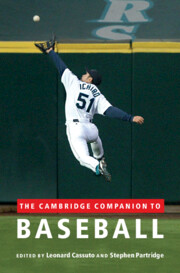Book contents
- Frontmatter
- Introduction
- 1 The rules of baseball
- 2 Baseball in literature, baseball as literature
- 3 Babe Ruth, sabermetrics, and baseball’s politics of greatness
- 4 Not the major leagues: Japanese and Mexican Americans and the national pastime
- 5 Baseball and the color line: from the Negro Leagues to the major leagues
- 6 Baseball and war
- 7 Baseball and the American city
- 8 Baseball at the movies
- 9 The baseball fan
- 10 Baseball and material culture
- 11 Global baseball: Japan and East Asia
- 12 Global baseball: Latin America
- 13 Cheating in baseball
- 14 Baseball’s economic development
- 15 Baseball and mass media
- A guide to further reading
- Index
9 - The baseball fan
Published online by Cambridge University Press: 28 July 2011
- Frontmatter
- Introduction
- 1 The rules of baseball
- 2 Baseball in literature, baseball as literature
- 3 Babe Ruth, sabermetrics, and baseball’s politics of greatness
- 4 Not the major leagues: Japanese and Mexican Americans and the national pastime
- 5 Baseball and the color line: from the Negro Leagues to the major leagues
- 6 Baseball and war
- 7 Baseball and the American city
- 8 Baseball at the movies
- 9 The baseball fan
- 10 Baseball and material culture
- 11 Global baseball: Japan and East Asia
- 12 Global baseball: Latin America
- 13 Cheating in baseball
- 14 Baseball’s economic development
- 15 Baseball and mass media
- A guide to further reading
- Index
Summary
Fred Stein 's A History of the Baseball Fan begins by describing the fan as “the least publicized or recognized figure in baseball.” Stein's next sentence, however, is an unintentional capitulation: “Baseball essentially is about the player … ” Here we will ask: Is it?
The proposition that baseball is essentially about spectatorship, not participation, would seem to present merely a philosophical question in a particular world that revels only in the instance. Keith Hernandez, one of the game's most cerebral players, is for example entirely uninterested in philosophical or abstract thought in any form. Contemplation – “thinking” is the favored term – is deemed by Hernandez a matter of conclusions derived from details. “I can't think about baseball other than in … specifics,” Hernandez writes in the preamble to Pure Baseball: Pitch by Pitch for the Advanced Fan. A moment-by-moment analysis of every move and motion made in two games played in June, 1993, Hernandez's book never once breaks out of the particular. Rarely has the term “pure” been used so completely to mean focused – untainted by rather than made lucid by theory. Hernandez will give us several pages about guessing a pitch on a favorable hitter's count, only, seemingly in the midst of writing the scene, to recall that his narrative is supposed to be for the fan. He had been addressing and instructing the batter (try such a guess late in a game, do not attempt this gambit too often, etc.), but then pulls up to urge: “So, as a fan, don't hold your breath waiting to see this trick.” Though admirable, Hernandez’s book is not about the fan, nor “for” the fan. The former player’s strength is pedagogical. He narrates authentic (“pure”) not ideal participation. The baseball fan in Pure Baseball is a marketing afterthought.
- Type
- Chapter
- Information
- The Cambridge Companion to Baseball , pp. 125 - 137Publisher: Cambridge University PressPrint publication year: 2011



